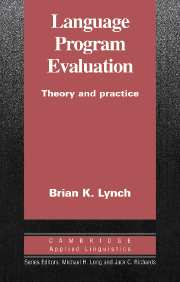Book contents
- Frontmatter
- Contents
- Series editors' preface
- Preface
- 1 Introduction
- 2 Historical background
- 3 Validity
- 4 Positivistic designs
- 5 Naturalistic designs
- 6 Quantitative data gathering and analysis
- 7 Qualitative data gathering and analysis
- 8 Combining positivistic and naturalistic program evaluation
- 9 Conclusions
- References
- Author index
- Subject index
1 - Introduction
Published online by Cambridge University Press: 05 October 2012
- Frontmatter
- Contents
- Series editors' preface
- Preface
- 1 Introduction
- 2 Historical background
- 3 Validity
- 4 Positivistic designs
- 5 Naturalistic designs
- 6 Quantitative data gathering and analysis
- 7 Qualitative data gathering and analysis
- 8 Combining positivistic and naturalistic program evaluation
- 9 Conclusions
- References
- Author index
- Subject index
Summary
It is probably safe to assume that the concept of program evaluation is not completely foreign to most applied linguists, even to those working outside the language education domain. Certainly the words program and evaluation conjure up reasonably clear mental images, and the notion that a program might need to be evaluated does not seem illogical to most. Language education programs abound internationally, and the majority of applied linguists have most likely, at some stage in their career, been involved in these programs as teachers, administrators, students, researchers, or some combination of these roles. Many, if not most, have been involved in some sort of effort to evaluate a language program. This evaluation may have taken the form of asking students to rate their language course and teacher using a questionnaire, giving achievement tests at the beginning and end of a period of instruction, or having a language teaching expert from another institution visit the program and prepare a report on its strengths and weaknesses. Program evaluation, then, can be seen as relevant to the experience of a wide range of applied linguists, and will be of particular interest to language educators.
Definitions: Applied linguistics, evaluation, program
In order to proceed with a detailed examination of the theory and practice of program evaluation within the broad context of applied linguistics, however, more precise definitions of certain terms are in order.
- Type
- Chapter
- Information
- Language Program EvaluationTheory and Practice, pp. 1 - 11Publisher: Cambridge University PressPrint publication year: 1995



